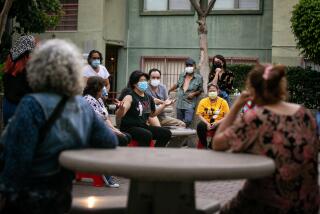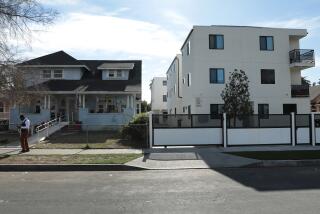Editorial: Amnesty for bootlegged apartments
In the city of Los Angeles, which has more renters than homeowners and some of the highest rents in the country, it’s not surprising that a market exists for so-called bootlegged apartments, extra units carved out of existing apartments and common areas in multi-unit buildings. They are illegal but generally affordable. Now, an unlikely alliance of landlords and tenants is urging city officials to consider granting amnesty to these unpermitted apartments as long as property owners bring them up to safety codes and do not pass on those costs to renters. That’s a smart approach.
The city’s Department of Housing discovers about 600 to 700 of these unpermitted units each year, but no one knows exactly how many exist, and some speculate that there could be 100 times that many. Landlords are often reluctant to go through the lengthy and costly process of bringing the units up to code.
An amnesty would speed up the permitting process and could motivate owners of non-compliant units to come forward and make them safer for renters. City Councilman Felipe Fuentes has asked city staff to research the possibilities. Not every owner would be eligible. The amnesty would apply only to units in areas zoned for multi-unit dwellings, so it wouldn’t cover illegal garage and basement apartments in areas zoned for single-family houses. And it would apply only to units in place now. It would not protect owners who tried to build new bootlegged apartments.
Those caveats are important, as is the need to regard amnesty as a temporary measure that should not lead the city to relax its zoning and building codes. Even if a property were granted amnesty, it would have to comply with those codes before it could be sold. If a building has expanded beyond its parking capacity, the city should force the owner to make the necessary accommodations. Amnesty should not become a substitute for enforcement.
Moreover, proponents should not oversell the potential of this idea. Regardless of whether the city grants amnesty to bootlegged units, leaders need to recognize that the underlying housing problem in Los Angeles is not the presence of substandard units. It is the shortage of affordable ones.
A recent study by UCLA’s Luskin School of Public Affairs found that renters in the Los Angeles area had a median “rent burden” — the percentage of their income going to rent — of 47%. That is the highest in the nation. Legalizing a few heretofore bootlegged units may ease that burden, but only thoughtful incentives and sustained attention can infuse this area with the affordable housing it so badly lacks.
Follow the Opinion section on Twitter @latimesopinion
More to Read
A cure for the common opinion
Get thought-provoking perspectives with our weekly newsletter.
You may occasionally receive promotional content from the Los Angeles Times.






